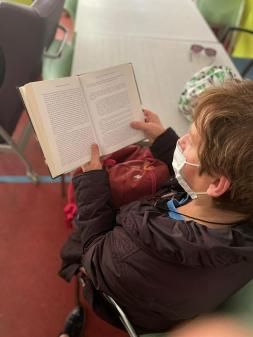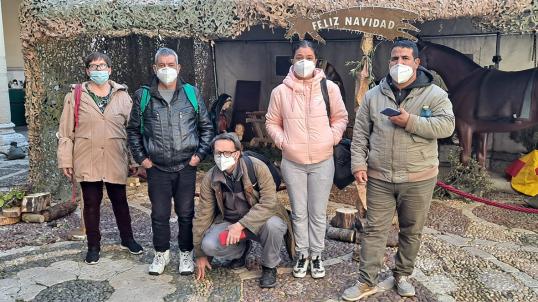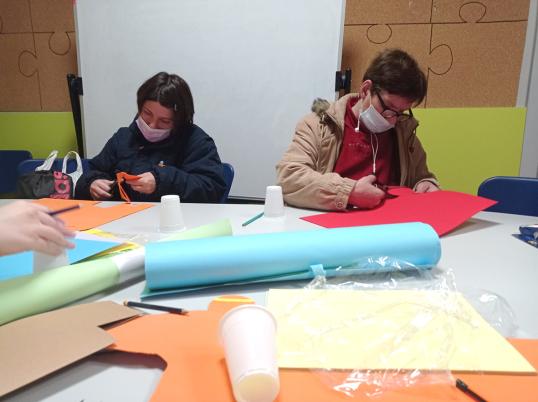Background
Valladolid is a municipality located in the centre of the northern half of the Iberian peninsula, with a population of around 300.000 people (2021). It is also the capital of the autonomous community (Region) and of the province of Castile and León.
The Law 16/2010, of 20 December, on social services of Castile y León, in its Article 5, states that the social services system aims to provide adequate coverage of basic personal and social needs, to promote the autonomy and well-being of people and ensure their right to live in dignity during all stages of their lives. Valladolid City Council, within the scope of its competences, regulates its social service system and the resources aimed at the most vulnerable people, such as the homeless.
Article 48 of Law 16/2010, of 20 December, on social services of Castilla y León, sets out that municipalities are responsible for the provision of basic emergency or social urgency aids and of emergency housing to temporarily shelter those who lack it.
There are various models of care, and the Department of Social Services of Valladolid intends to develop a model centered on the person. The aim is to go beyond just providing shelter and food in emergency situations and to work on personalised integration projects.
Through its strategy ‘Instruction 1/2018, on the promotion of socially responsible public procurement - strategic, honest and sustainable - in the Municipality of Valladolid and local public entities’, the City Council of Valladolid is committed to use existing resources for public procurement to implement EU and national public policies on social and environmental affairs, economic development, and the promotion of innovation and small and medium-sized enterprises (SMEs) (to know more, you can read the related case study).
Furthermore, this public procurement procedure contributes to the achievement of the Sustainable Development Goals of the UN 2030 Agenda, in particular:
• Goal 1. Eradicate extreme poverty for all people everywhere; 1.5. Build the resilience of the poor and people in vulnerable situations and reduce their exposure and vulnerability to climaterelated extreme events and other economic, social and environmental disasters and;
• Goal 2. 0 Hunger and targets 2.1 End hunger and ensure access for all people, in particular the poor and people in vulnerable situations.
Procurement objectives
The objectives of this procurement procedure are to provide comprehensive care for homeless people in Valladolid through the management of the Municipal Shelter in the Integrated Centre for Homeless People, as well as to inform, advise on various resources, design individualised integration pathways and refer homeless people in Valladolid to other relevant social, health and employment services.
The aim of the Municipal Shelter is to not only provide a place to spend the night to all people in need, providing overnight temporary accommodation, breakfast and the necessary means for their personal hygiene, but also to deliver other complementary services, such as a daytime reception area for leisure and training activities for the homeless and their rest.
This contract has to be seen in the context of a shift in the design and provision of social services to homeless people that the Municipality wanted to implement, which was accelerated by the COVID-19 pandemic. Before the pandemic, support for homeless people was just the satisfaction of basic needs such as the provision of accommodation and food. In recent years, the Municipality has moved towards a people-centred approach, grounded in a human rights perspective (embedded in the Comprehensive National Strategy for Homelessness 2015-2020), with care provided 24 hours a day, every day and 365 days per year.
The service object of this contract complements in a very important way other services included in a wider network of care for the homeless, which include:
• The reception, care and guidance services, both of Valladolid City Council itself and of other entities that deal with this group.
• The social canteen of Valladolid City Council, which attends to the food needs of these people with a lunch and dinner service 365 days a year.
• Street care services provided by Valladolid City Council itself and by other organisations that deal with this group.
• Low-demand centres, wardrobe, lockers and toilets.
• Housing First project flats of Valladolid: contrary to many traditional homeless services, where people are first expected to demonstrate they are able to live independently, before they can access stable housing, a Housing First service provides housing as soon as possible, supported by specific policies and practices.
For the award of this contract, the contracting authority decided to reserve the right to participate to organisations of a social, cultural or health nature fulfilling the conditions specified in Article 77.2 of Directive 2014/24/EU (transposed by Forty-eighth Additional Provision of Spanish Law 9/2017, of 8 November, on Public Sector Contracts). In fact, third sector organisations participate in a very active way in providing care and social inclusion intervention to homeless people.
Tender requirements
In addition to the management of the shelter and the day-care centre, the contractor was requested to provide the following services aimed at the comprehensive care of the users of the centre:
• Personal hygiene and cleanliness: provision of basic materials (soap, towel, toilet paper...) necessary for the toilet of the users and ensuring that a regular shower and toilet regime is carried out.
• Laundry service: provision of an industrial laundry service for bed and bath linen; bed and bath linen shall be changed daily when there is a change of user, and very frequently (maximum every three days) when the bed is used by the same user.
• Cleaning service: undertaking the cleaning of the centre every day of the week and organising and supervising the cleaning of the rooms by the users themselves who, as a basic daily task, will be responsible for cleaning their own rooms. Periodic disinfection of the building and installations to be carried out every three months.
• Pharmacological and medical monitoring: control, facilitation and pharmacological and medical monitoring by the contractor’s nursing staff and by the public health service of the users who need it and do not have sufficient control to do so themselves.
• Maintenance service: preventive and corrective maintenance of the facilities and equipment of the centre.
• Communication and IT: provision of the digital and communication means to ensure adequate running of the service.
The following professional profiles were required for the execution of the contract:
• A general coordinator of the service.
• At least two social workers on each shift in the category of social services monitor or assistant for all hours of the day, 365 days a year, with a total estimation of at least 11 full time social workers.
• A part-time technical coordinator responsible for the organisation, coordination and management of the service.
• A nurse present six hours per week.
• For the development of the service, the contractor was requested to have in place a volunteering programme that provides volunteer staff to carry out support tasks, with a demonstrable relevant experience and training, and in possession of liability insurances.
Award criteria
The contract was awarded to the tenderer with the most economically advantageous tender, determined on the basis of the best price-quality ratio which was weighted 30% price/70% quality. Given that the aim of the contract is not only to provide meals and overnight stays, but also to develop activities in the day centre and networking with other entities and institutions, the quality of the project related to the proposed model of care and inclusion, including the organisational and staff management model, was prioritised over criteria of an economic nature.
Under Spanish law, social services are one of the services for which the criteria related to quality must represent at least 51% of the score assignable in the evaluation of bids. In addition, since value driven quality criteria were weighted higher than 40 %, the evaluation was carried out by a committee of independent experts.
The following award criteria were set:
1. Technical proposal of the project. Theoretical proposal, contextualisation and suitability of the project, as well as criteria on which the organisation and operation of the services will be based (0-25 points).
2. Methodological proposals for the social and labour inclusion of users, relating to the organisation and planning of the activities to be carried out for the care of homeless people (0- 25 points).
3. Administrative and organisational management: a) Proposal for the organisation and management of staff; b) Management of material resources; and c) Proposal for staff training and occupational risk prevention plan (0-10 points).
4. Quality control of service: a) Monitoring, coordination and evaluation of the functioning of the service and b) Methods for assessing the quality of the service (0-10 points).
Bids that did not reach at least 35 points, were not admitted to the evaluation of the financial offer.
Contract performance clauses
The following contract performance clauses were included:
-Social clauses:
• The minimum mandatory clauses, established in clause 42 of the Specific Administrative Specifications for the contracting of services by the City Council of Valladolid, specified below in a) and b): a) Ensuring pay equality between women, men and other workers of different sexual identity or status or gender expression; b) Use of unisex dress codes, if requested by workers. In addition and specifically in relation to this contract, c) the contractor was requested to hire one person belonging to the following groups: people with disabilities, recipients of guaranteed citizenship income/ minimum living income or women victims of gender violence, or other people with difficulties in accessing the labour market such as young people under 25 years of age, over 50 years of age, etc.
-Environmental clauses
• When vehicles or machinery are used in the execution of the contract, at least one hybrid, electric or natural gas-powered vehicle or machine must be incorporated.
• All paper used to document work related to the service must have FSC (Forest Stewardship Council) or equivalent certification.
• An additional contract performance clause was included: the entity awarded the contract must achieve certification in accordance with the UNE 9001:2015 Standard or equivalent for the municipal hostel of Valladolid City Council, within a maximum period of 12 months from the conclusion of the contract.
The contractor also has the following obligations:
• Developing an annual community activity to ensure social cohesion, related to care for the environment, with the participation of homeless people and other social actors such as non-profit organisations, such as environmental action projects in the neighbourhood of La Victoria, Fuente El Sol, or Cuesta de la Maruquesa.
• Carrying out an annual social integration activity with artistic and cultural content, with the participation of homeless people and other social actors, such as the organisation of painting or short story competitions or contests on issues of social integration, social rights and coexistence.
The personnel assigned to the execution of this contract are subject to the State Collective Agreement for Social Action and Intervention published on 3 July 2015 and amended in the Official State Gazette of 1 February 2019.
Results
Two bidders participated: Intras Foundation, which was awarded the contract, and Samu Foundation. Intras Foundation is a non-profit organisation, whose aim is to research and provide treatment in the field of mental health, and to deliver social services to persons with disabilities, with mental health problems, or in a situation of addiction, as well as more generally to people in vulnerable situations. The technical offer of the winning tenderer was given the following scores: 25 points for the technical proposal, 25 points for the methodology and planning of activities, 8 points for the administrative and organisational management and 8 points for quality assurance.
The contract was awarded by the Local Government Board on March 3, 2021 and was signed by the parties on March 26, 2021, for three years. The contract value was 2.208.690,00 €.
Environmental and social impacts
In the annual report covering the first year of the contract, the contractor reported the following data:
• 20.079 overnight stays which equates to an occupancy rate of 89% of the available places.
• A total of 515 people have been hosted, with a monthly average of 105 people, of which 84% are men compared to 16% women; in terms of origin, 48% of the people assisted are nationals as opposed to 52% foreigners. 182 residents are from the age group 18 to 35, 319 from 35 to 65, and 14 residents are 65 and over.
• 125 people required medical and pharmacological control and 24 people were fully vaccinated against COVID-19.
• It has been possible to interview the vast majority of shelter users who have stayed at the centre for more than a week and to make an individualised clinical history of each user. The complete and continuous drug treatment was provided in 99% of cases, as well as the relevant medical tests, in coordination with Health Centres and Mental Health Centres, as well as entities specialised in Mental Health and/or Addictions.
• At the Day Care centre, 407 inclusion activities took place in which 292 users participated (e.g. use of computers and new technologies, economic welfare, housing search, support for autonomy in one’s own home, learning the language and culture of the host country, support for employability, active job search workshops, living together).
• 117 sport or leisure activities took place (e.g. petanque, football, back school, rugby, hiking, yoga, workshops and/or trainings or leisure activities promoted by other entities).
• Participation of homeless people in 90 community-based activities (museums, events, Homeless People’s Day, participation in artistic activities such as Sin Sombrero, exhibition halls, city tours, historical buildings, etc.).
• 58 activities implemented to enhance social skills or of therapeutical nature (e.g. social skills, self-esteem, reading workshop, art therapy, writing, and theatre).
• 57 users elaborated their life projects. A life plan is the plan that a person establishes for him/herself, in which he/she describes aspects of the life that he/she chooses to live, from his/her personal perspective of what he/she chooses to live and from his/her concept of wellbeing.
The added value of elaborating a life plan is that it is a way of expressing self-determination, it provides the person with a sense of control over his or her own life and it helps to define the person’s identity.
• 14 users participated in the socio occupational integration pathway in basic kitchen operations and cleaning services funded by the social services department of Castile and León and the European Social Fund.
• The following 8 training activities amounting to 282 training hours were addressed to the staff of the Centre: food handling, safety and prevention of occupational risks, emergency measures, gender equality, intercultural mediation, psychological accompaniment and ISO-9000 quality management.
• 3 volunteers performed different support functions at the Centre, such as support in reception and kitchen tasks; emotional support and listening functions, and activities such as language workshops, music, handicrafts, relaxation and hairdressing.
Lessons learned
For the continuous monitoring of the provision of the service, a technical monitoring committee was created; it is composed of the person responsible for contract and the technicians responsible for the care of homeless people on behalf of the Municipality, and of the person responsible for the contract designated by the contractor and the technician responsible for the centre. This committee meets regularly every six months, as well as whenever necessary to fulfil its tasks. The persons responsible for this contract on behalf of the Municipality may carry out inspections to oversee the development of the service at any time.
The contractor also has the obligation to complete the reports and documentation requested for proper monitoring of the activities and the users, as well as to submit an annual quantitative and qualitative evaluation of the management of the contract, by also specifying how the objectives of the contract have been achieved. This evaluation shall expressly include the participation and degree of satisfaction of the users of the centre’s services.
The main lessons learned from this procedure are the following:
• Care for homeless people needs a community-based municipal hostel, which is connected in a network with other services, social service providers and NGOs, and offers a temporary solution to empower users to get access to mainstream social and care services; this service should not be an infrastructure in isolation; community-based also means working with the local community, including by developing synergies with EU projects funded to NGOs in the city, to tear down stereotypes towards homeless people and in general towards people in vulnerable situations.
• It is important to adopt a holistic needs-based people centred approach to beneficiaries, which includes taking account of user’s lower intensity needs that tend to be missed out in standard processes.
• It is recommended to draft technical specifications in a very precise manner and to give as much weight as possible to value driven quality award criteria; a key award criterion is to require that the bidder properly plans how to collaborate with other players and the wider network of organisations that work on these issues.
• The contract needs to be flexible to address sudden changes (e.g. extra demand due to sudden adverse meteorological conditions).
• For a contracting authority, it is extremely helpful that an internal strategy validated by the legal services is in force, which provides the principles and detailed guidance on how contracts must be drafted and interpreted, in compliance with Spanish law on public contracts and Directive 2014/24/EU.
More information
Contact person: Ana Isabel Page Polo, Head of the Executive Secretariat for Social Services and Community Mediation.
Tender documents available online.



